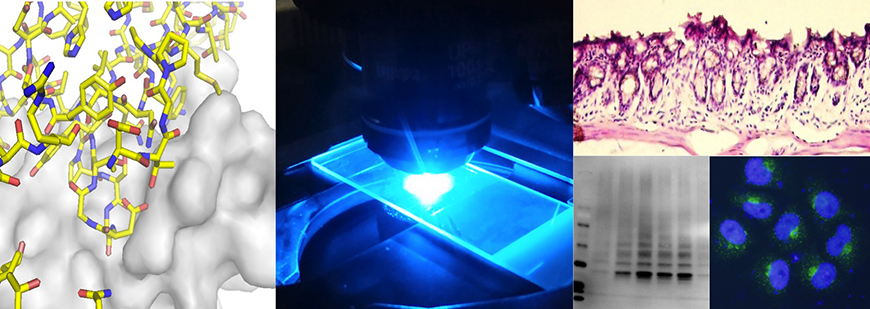Laboratory of Microbiology

Staff
Taisei Kanamoto, Ph.D.Professor
Daisuke Asai, Ph.D.Associate Professor
Mizuho Kajikawa, Ph.D.Senior Assistant Professor
Molecular Investigations into Host-Microbe Interactions
Molecular basis of the immune evasion by oncovirus
Viruses have evolved various mechanisms to evade host immunity. Kaposi’ssarcoma-associated herpesvirus (KSHV), associated with several human tumors,encodes many types of immune evasion molecules in its genome to establish latentinfection.
Modulator of immune recognition 1 and 2 (MIR1 and 2) are homologous E3 ubiquitinligases and induce a dramatic degradation of human major histocompatibilitycomplex class I (MHC-I) by ubiquitin-mediated endocytosis. Since MHC-I is such acritical immune receptor for protection from viral infection, these ubiquitin E3 ligasesare considered important molecules for the immune evasion by KSHV. Intriguingly,MIR2 can downregulate other important immune receptors in addition to MHC-I, e.g.B7-2 and ICAM1. This additional function suggests that MIR2 is a critical E3 ubiquitinligase to establish full immune evasion by KSHV, because these additional MIR2substrates are also involved in the activation of T cells.
We investigate the molecular mechanism of viral MIR ubiquitin ligases. Our researchwill provide us new insights for novel anti-KSHV treatment.
Interactions between the host immune system and the microbiota
Microorganisms exist everywhere in nature. Some microorganisms cause us to bephysically sick; the others give us a beneficial- or non- effect on health. Especially,beneficial or harmless resident bacteria in our body are called commensal bacteria.
Immune system of gastrointestinal tract has huge amount of lymphocyte and complexmechanisms. Mucosal surfaces are exposed about diverse proteins derived fromnon-self organisms such as foods, viruses and bacteria. Mucosal immune system hasbeen equipped with apparently paradoxical reactions, which are rejection ofpathogens and tolerance to commensal bacteria.
We investigate how to regulate those paradoxical immune mechanisms from a host-or microorganism- standpoint and a host-microorganisms interaction by biologicaland immunological methods and multiple analyses.